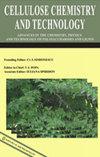FABRICATION AND CHARACTERIZATION OF ELECTROSPUN POLYLACTIC ACID FILMS REINFORCED WITH CHILEAN BAMBOO CELLULOSE NANOFIBERS
IF 1.1
4区 农林科学
Q2 MATERIALS SCIENCE, PAPER & WOOD
Cellulose Chemistry and Technology
Pub Date : 2023-07-20
DOI:10.35812/cellulosechemtechnol.2023.57.54
引用次数: 0
Abstract
Films with uniform fibers composed of polylactic acid (PLA) reinforced with cellulose nanofibers (CNF), with loadings of 1%, 3% and 5%, have been fabricated by electrospinning. The CNF were obtained from Kraft pulp of Chusquea quila, by mechanical high shear treatment in a microfluidizer. For the reinforcement treatment, the CNF were acetylated before preparing the PLA electrospun solution. The obtained CNF were observed using atomic force microscopy (AFM) and analyzed after acetylation using FT-IR spectroscopy to confirm their modification. Morphology studies on the films were conducted using scanning electron microscopy (SEM). The films were tested via tearing tests according to ASTM D1938 (2014). Besides, the films were subjected to photodegradation experiments according to ASTM D4329 (2013) and to mechanical testing to analyze the influence of photodegradation on their mechanical properties. The addition of 1% CNF was translated into an important increase in tear strength, which in some cases reached a 37% increase. After the photodegradation test, the films lost up to 46% of their original tensile strength.用智利竹纤维素纳米纤维增强的电纺聚乳酸薄膜的制备与表征
通过电纺丝技术制造出了由聚乳酸(PLA)和纤维素纳米纤维(CNF)组成的均匀纤维薄膜,纤维素纳米纤维的负载量分别为 1%、3% 和 5%。CNF 取自 Chusquea quila 的牛皮纸浆,在微流化器中通过机械高剪切处理获得。为了进行增强处理,在制备聚乳酸电纺丝溶液前对 CNF 进行了乙酰化处理。使用原子力显微镜(AFM)观察获得的 CNF,并使用傅立叶变换红外光谱分析乙酰化后的 CNF,以确认其改性。使用扫描电子显微镜(SEM)对薄膜进行了形态学研究。根据 ASTM D1938(2014)标准对薄膜进行了撕裂测试。此外,还根据 ASTM D4329(2013 年)标准对薄膜进行了光降解实验,并进行了机械测试,以分析光降解对薄膜机械性能的影响。添加 1% 的 CNF 可显著提高撕裂强度,在某些情况下可提高 37%。经过光降解测试后,薄膜的拉伸强度降低了 46%。
本文章由计算机程序翻译,如有差异,请以英文原文为准。
求助全文
约1分钟内获得全文
求助全文
来源期刊

Cellulose Chemistry and Technology
工程技术-材料科学:纸与木材
CiteScore
2.30
自引率
23.10%
发文量
81
审稿时长
7.3 months
期刊介绍:
Cellulose Chemistry and Technology covers the study and exploitation of the industrial applications of carbohydrate polymers in areas such as food, textiles, paper, wood, adhesives, pharmaceuticals, oil field applications and industrial chemistry.
Topics include:
• studies of structure and properties
• biological and industrial development
• analytical methods
• chemical and microbiological modifications
• interactions with other materials
 求助内容:
求助内容: 应助结果提醒方式:
应助结果提醒方式:


